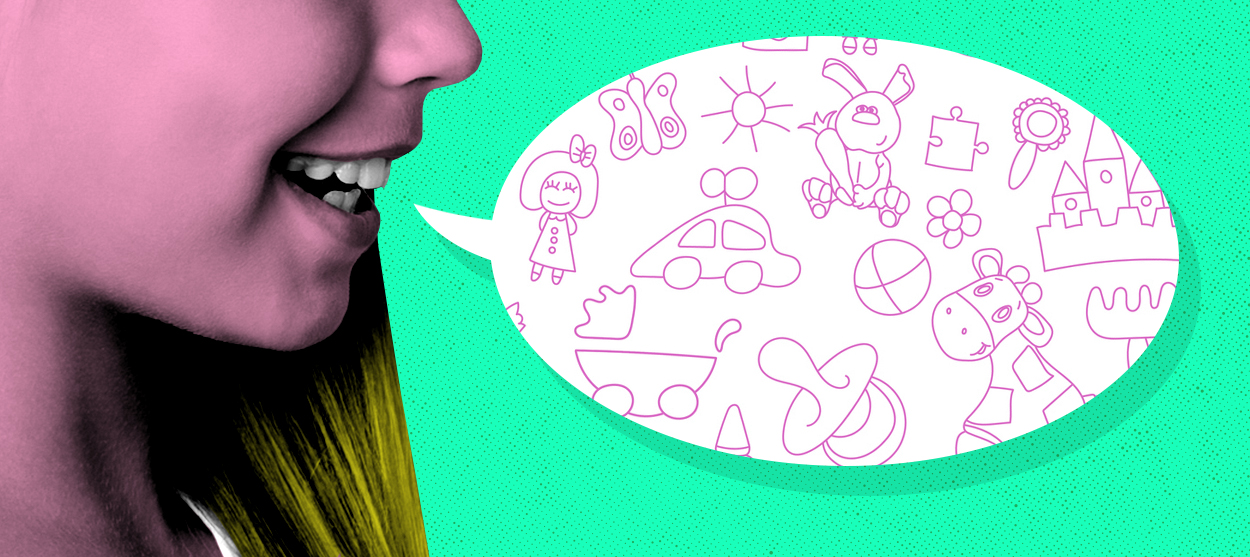My tween, the big baby
Why your child is regressing — and what to do about it


A free daily email with the biggest news stories of the day – and the best features from TheWeek.com
You are now subscribed
Your newsletter sign-up was successful
Baby talk is cute — but only when it comes out of the mouth of an actual baby. Preschoolers can get away with it — barely. But when anybody over the age of five does it, it's cringeworthy.
If baby talk is your bugbear, it can be hard not to bristle when your "big" kid asks for "a widdle dwink" or comes out with a stream of "goo-goo-ga-ga." But chances are, they're not doing it to annoy you. It's not unusual for children of all ages to revert back to younger developmental stages, especially during times of stress.
"This could include talking baby talk, a sudden interest towards a previous lovey/stuffed animal or blanket, thumb sucking, and/or exhibiting other unusual behaviors you wouldn't expect from their age (or haven't seen in a long time)," says licensed clinical psychologist and parenting evaluator Melanie English, Ph.D.
The Week
Escape your echo chamber. Get the facts behind the news, plus analysis from multiple perspectives.

Sign up for The Week's Free Newsletters
From our morning news briefing to a weekly Good News Newsletter, get the best of The Week delivered directly to your inbox.
From our morning news briefing to a weekly Good News Newsletter, get the best of The Week delivered directly to your inbox.
The pre-adolescent period in particular can be unsettling for lots of kids. "While children are continuously growing toward some level of independence, there are two big pushes for independence in childhood: toddlerhood and adolescence," says the founder of Your Village Erin Royer-Asrilant, who has a master's degree in psychology and a specialty in child development and family relationships. "These are times when children are feeling compelled at almost every turn to take on more autonomy. But with this push, there is often a strong pull, too."
In toddlerhood, there's a big push for independence, which is often accompanied by serious separation anxiety. "They will run off to the slide at the playground only to run back and check in with their parent a few minutes later for a hug or other reassurance," Royer-Asrilant says. "Children want both autonomy and security, so they are constantly working to seek a perfect balance. It's a case of, 'let me do what I want, but also be there for me when I need you.'"
For tweens and adolescents, regressing back to younger behaviors is a way of regaining their sense of security while simultaneously undergoing a major emotional and physical maturation, Royer-Asrilant explains. "Adolescence is the real deal — the final growth into adulthood," she says. "It can be pretty scary when it hits."
It's also common for pre-teens to feel highly conflicted about growing up, says licensed marriage and family therapist Wendy O'Connor. They may use their "big kid" voice with their peers, but use a baby voice with their parents. "They may be concerned that they will still be treated the same if they grow up, or wonder if they need to use a baby voice to get their way," O'Connor says. "They might even be worried about hurting their parents' feelings by growing up. Guilt around growing up is rarely talked about, but it happens all the time."
A free daily email with the biggest news stories of the day – and the best features from TheWeek.com
The good news, then, is that baby talk from kids who left the baby stage a long time ago is perfectly normal. The bad news? It might last a lot longer than it did the first time round. "It's common for pre-teens to display this kind of behavior for a little longer than expected," O'Connor says. "It's not unusual for it to start at age nine or younger, and in some cases it can continue until age 14."
Luckily, there are things you can do. First of all, acknowledge that your child is growing up and reassure them that change is normal. "It's good to normalize the developmental stages," O'Connor says. She suggests saying something like, "I'm noticing at times you use a baby voice, and I want to let you know I love you and it's okay however you want to communicate with me… but it's okay to grow up, too."
Basically, it's the tween equivalent of a comforting hug on the playground.
If reassurance doesn't have the desired effect, you can help your child find more mature ways of sharing anxious feelings. Royer-Asrilant suggests teaching kids a full emotional vocabulary — words like "stressed," "pressured," "anxious," "threatened," and "inferior" — to help them express their feelings.
Dr. English suggests encouraging children to appreciate all the good things about the age they are at right now. Parents can't wave a magic wand and make all their kids' worries disappear, but they can offer reassurance that this moment will pass, and growing up can be pretty great.
Want more essential commentary and analysis like this delivered straight to your inbox? Sign up for The Week's "Today's best articles" newsletter here.
Claire Gillespie is a freelance writer with bylines on Health, SELF, Refinery29, Glamour, The Washington Post, and many more. She likes to write about parenting, health, and culture. She lives in Scotland with her husband and six kids, where she uses every (rare) spare moment to work on her novel.
-
 How the FCC’s ‘equal time’ rule works
How the FCC’s ‘equal time’ rule worksIn the Spotlight The law is at the heart of the Colbert-CBS conflict
-
 What is the endgame in the DHS shutdown?
What is the endgame in the DHS shutdown?Today’s Big Question Democrats want to rein in ICE’s immigration crackdown
-
 ‘Poor time management isn’t just an inconvenience’
‘Poor time management isn’t just an inconvenience’Instant Opinion Opinion, comment and editorials of the day
